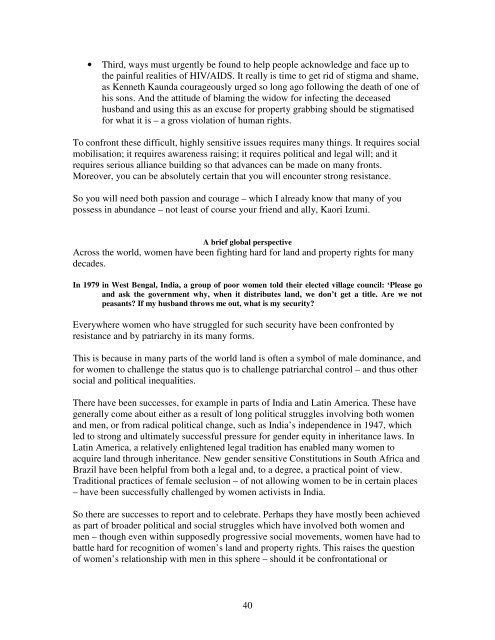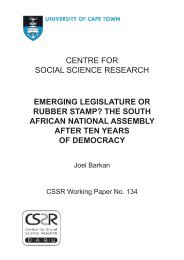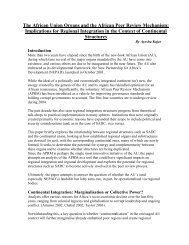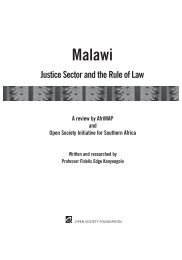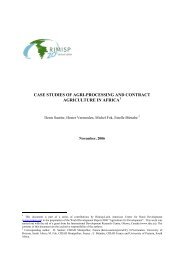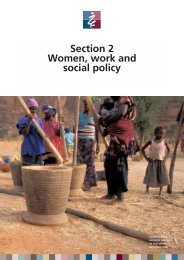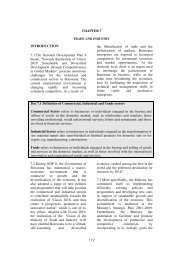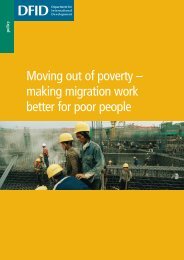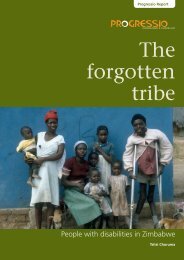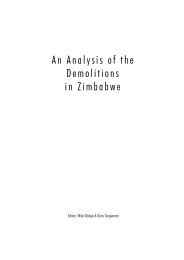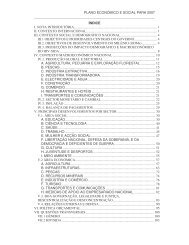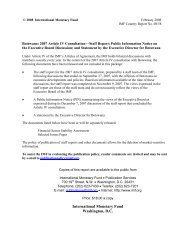Report of the National Conference: Women's Property Rights ... - FAO
Report of the National Conference: Women's Property Rights ... - FAO
Report of the National Conference: Women's Property Rights ... - FAO
Create successful ePaper yourself
Turn your PDF publications into a flip-book with our unique Google optimized e-Paper software.
• Third, ways must urgently be found to help people acknowledge and face up to<strong>the</strong> painful realities <strong>of</strong> HIV/AIDS. It really is time to get rid <strong>of</strong> stigma and shame,as Kenneth Kaunda courageously urged so long ago following <strong>the</strong> death <strong>of</strong> one <strong>of</strong>his sons. And <strong>the</strong> attitude <strong>of</strong> blaming <strong>the</strong> widow for infecting <strong>the</strong> deceasedhusband and using this as an excuse for property grabbing should be stigmatisedfor what it is – a gross violation <strong>of</strong> human rights.To confront <strong>the</strong>se difficult, highly sensitive issues requires many things. It requires socialmobilisation; it requires awareness raising; it requires political and legal will; and itrequires serious alliance building so that advances can be made on many fronts.Moreover, you can be absolutely certain that you will encounter strong resistance.So you will need both passion and courage – which I already know that many <strong>of</strong> youpossess in abundance – not least <strong>of</strong> course your friend and ally, Kaori Izumi.A brief global perspectiveAcross <strong>the</strong> world, women have been fighting hard for land and property rights for manydecades.In 1979 in West Bengal, India, a group <strong>of</strong> poor women told <strong>the</strong>ir elected village council: ‘Please goand ask <strong>the</strong> government why, when it distributes land, we don’t get a title. Are we notpeasants? If my husband throws me out, what is my security?Everywhere women who have struggled for such security have been confronted byresistance and by patriarchy in its many forms.This is because in many parts <strong>of</strong> <strong>the</strong> world land is <strong>of</strong>ten a symbol <strong>of</strong> male dominance, andfor women to challenge <strong>the</strong> status quo is to challenge patriarchal control – and thus o<strong>the</strong>rsocial and political inequalities.There have been successes, for example in parts <strong>of</strong> India and Latin America. These havegenerally come about ei<strong>the</strong>r as a result <strong>of</strong> long political struggles involving both womenand men, or from radical political change, such as India’s independence in 1947, whichled to strong and ultimately successful pressure for gender equity in inheritance laws. InLatin America, a relatively enlightened legal tradition has enabled many women toacquire land through inheritance. New gender sensitive Constitutions in South Africa andBrazil have been helpful from both a legal and, to a degree, a practical point <strong>of</strong> view.Traditional practices <strong>of</strong> female seclusion – <strong>of</strong> not allowing women to be in certain places– have been successfully challenged by women activists in India.So <strong>the</strong>re are successes to report and to celebrate. Perhaps <strong>the</strong>y have mostly been achievedas part <strong>of</strong> broader political and social struggles which have involved both women andmen – though even within supposedly progressive social movements, women have had tobattle hard for recognition <strong>of</strong> women’s land and property rights. This raises <strong>the</strong> question<strong>of</strong> women’s relationship with men in this sphere – should it be confrontational or40


